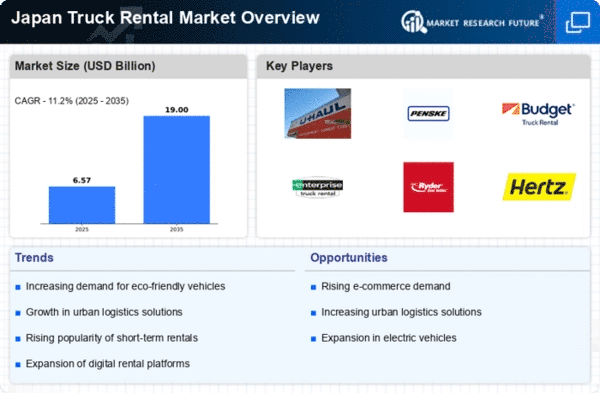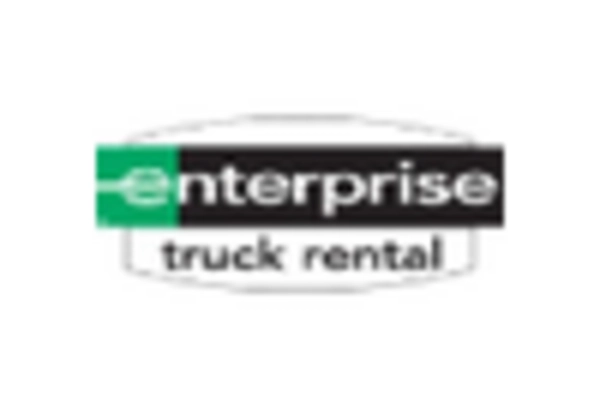E-commerce Growth
The rapid expansion of e-commerce in Japan is a pivotal driver for the truck rental market. As online shopping continues to gain traction, businesses require efficient logistics solutions to meet consumer demand. In 2025, e-commerce sales in Japan are projected to reach approximately ¥20 trillion, necessitating increased transportation capabilities. This surge in demand for delivery services compels companies to utilize truck rentals for last-mile logistics. The truck rental market is thus positioned to benefit from this trend, as businesses seek flexible and scalable transportation options to accommodate fluctuating delivery volumes. Furthermore, the need for timely deliveries enhances the appeal of truck rentals, which offer a cost-effective alternative to owning a fleet. Consequently, the growth of e-commerce is likely to stimulate further investment in the truck rental market, fostering innovation and service diversification.
Environmental Regulations
Japan's stringent environmental regulations are increasingly shaping the truck rental market. The government has implemented various policies aimed at reducing carbon emissions and promoting sustainable transportation practices. In 2025, compliance with these regulations is expected to drive demand for eco-friendly truck rental options. The truck rental market is likely to see a rise in the availability of electric and hybrid vehicles, catering to businesses seeking to align with environmental standards. This shift not only helps companies reduce their carbon footprint but also enhances their brand image in an eco-conscious market. Furthermore, as businesses face penalties for non-compliance, the urgency to adopt sustainable practices may lead to a greater reliance on truck rentals that offer environmentally friendly solutions. Consequently, the evolving regulatory landscape presents both challenges and opportunities for the truck rental market.
Infrastructure Development
Japan's ongoing infrastructure development initiatives significantly influence the truck rental market. The government has allocated substantial budgets for enhancing transportation networks, including roads and highways, which facilitates smoother logistics operations. In 2025, infrastructure spending is expected to exceed ¥10 trillion, creating a favorable environment for the truck rental market. Improved infrastructure not only reduces transit times but also enhances the overall efficiency of logistics operations. As businesses increasingly rely on timely deliveries, the demand for truck rentals is likely to rise. Moreover, the expansion of logistics hubs and distribution centers across the country further supports the growth of the truck rental market. This trend indicates that as infrastructure improves, the operational capabilities of truck rental services will also enhance, making them more attractive to businesses seeking reliable transportation solutions.
Rising Urban Mobility Needs
The increasing urbanization in Japan is reshaping the transportation landscape, thereby impacting the truck rental market. As urban areas expand, the demand for efficient transportation solutions becomes more pronounced. In 2025, urban populations are projected to account for over 90% of Japan's total population, leading to heightened mobility needs. The truck rental market is poised to address these needs by providing flexible rental options for businesses operating in densely populated areas. Urban logistics challenges, such as traffic congestion and limited parking, further drive the necessity for rental services that can adapt to varying demands. Additionally, the trend towards smaller, more agile vehicles in urban settings may encourage businesses to opt for truck rentals rather than maintaining large fleets. This shift suggests that the truck rental market will play a crucial role in meeting the evolving mobility requirements of urban centers.
Technological Advancements in Fleet Management
Technological advancements in fleet management are transforming the truck rental market in Japan. Innovations such as telematics, GPS tracking, and route optimization software are enhancing operational efficiency and customer satisfaction. In 2025, the adoption of these technologies is expected to increase, with a projected market growth rate of 15% in fleet management solutions. The truck rental market stands to benefit from these advancements, as they enable rental companies to offer more reliable and efficient services. Enhanced tracking capabilities allow businesses to monitor their shipments in real-time, improving transparency and accountability. Additionally, data analytics can help rental companies optimize their fleet utilization, reducing costs and improving service delivery. This technological evolution suggests that the truck rental market will continue to evolve, driven by the need for improved logistics solutions in an increasingly competitive environment.
















